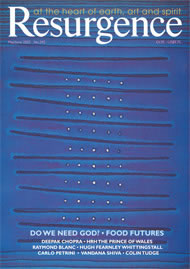TERRA MADRE, HELD for the second time in Turin from 26th to 30th October last year, is at once an event, an ideal and a network. Every two years it brings together about 1,200 food communities from more than 150 countries, represented by about 5,000 people: peasants, artisans, fisherfolk, nomad shepherds and more besides. Last year this incredibly various humanity was joined by 1,000 cooks from all over the world and 250 representatives of universities that have decided to work with these communities for the cause of good and sustainable food. More than 6,000 people flocked to Terra Madre, the largest assembly on the production of sustainable food the world has ever seen. For five days they gathered at theme meetings to exchange ideas and opinions, offering and asking for help.
Terra Madre is the brainchild of Slow Food, the international association born in 1989 as an eco-gastronomic movement for “the defence of the right to pleasure”, which has evolved over the last few years to draw up the rules of what many have since described as “eco-gastronomy”. The gastronome who loves the taste and aroma of good food cannot ignore how this food is produced or be aware of the problems that afflict the world’s small food producers at this moment of epoch-making economic and ecological transformation. Food, therefore, must not only be ‘good’ but also ‘clean’ – meaning that it has to be the product of sustainable processing and distribution – and socially ‘fair’ (I refer here to the living conditions of the millions of people who inhabit the world’s rural areas and produce the food that ends up on our tables). These three fundamental principles – the good, the clean and the fair – define a new standard of quality that Slow Food and the people of Terra Madre want to make known and available to all.
The Terra Madre food communities – geographical groups linked by a specific productive activity, or members of the same production chain, or groups of people who manage to be self-sufficient – represent the hope of those of us who are working to create a fairer global food system capable of producing better food. With their daily labour, such people ensure the protection of biodiversity, local traditions, gastronomic identities and knowledge, which risk disappearing in the face of the homogenisation of food as a result of the centralisation of production and the globalisation of distribution.
The first to suffer the consequences of the agri-food system have been these peasant farmers and others like them who produce food in harmony with nature. Besides strenuously defending them, we also have to listen to what they have to say. Though, at first sight, the forms of economy and production they practise may appear archaic – with respect to a certain type of modernity – they actually contain many solutions that could effectively rebalance and render sustainable the world food system. Modernity as we know it has led the world almost to a state of collapse. The surprising thing is that such problems are largely caused by food production.
If we restore food to a central role in our lives and interests, in our policies and our research, we may still be able to come up with real solutions to reverse a trend that appears increasingly unstoppable and ever likely to take us to the edge of the precipice.
The Terra Madre food communities teach us as much: they know how to combine traditional wisdom with the most advanced academic research, to respect nature and, thanks to simple common sense, never to expect of it more than it can give. They respect the soil by maintaining its fertility, they manage natural biodiversity without focusing obsessively on monocultures or methods of cultivation that use chemicals excessively and they practise an economy that is as far as possible local, thus ensuring the sustainable distribution of healthy, fresh, tasty produce.
Through Terra Madre, farmers, fisherfolk, shepherds and artisans have reinforced and re-established pride in what they do and have shown a willingness to work for a common objective. If, during the first Terra Madre in 2004, strategies were still very confused and the event was concentrated around the ‘miracle’ of 5,000 people like this from all over the world meeting in the same place simply to speak to each other, in the last two years much has changed. It is as if we had prepared the soil for sowing, fertilised it, and were now ready to reap its fruits.
THE SEED TO be sown is that of the local economy, typical of communities working for their own common good, but also interconnected in a much broader network that, besides being supportive, is also capable of spreading the message and model of an alternative food system. The local economy practised by food communities is the antithesis of the market economy; based on the principles of solidarity and subsidiarity, it is the true force of people who know how to produce food properly. Food communities strive to abbreviate the distance between producer and consumer and work together in harmony for their own wellbeing, endowing their own local areas with prosperity, health and beauty.
Terra, Earth, is our common home and, as such, should be run with an honest economy – a natural economy. At the moment, alas, this Earth of ours is governed, forcefully and often arrogantly, by a mad logic that demands more and more natural resources and a model of consumption characterised by speed and waste. If all this is becoming increasingly clear, what is less clear is the extent of our complicity and responsibility as individual consumers in what we define as the ‘developed’ world. This is precisely why it is hard for us, citizens of this ‘developed’ world, to change the system. We, maybe despite ourselves, are responsible too. However, if we procure our food locally, we offer true, frank and committed support to the relocation of consumption and agricultural production.
I BELIEVE THIS is a vision of the utmost modernity. Only through the dignity and decency of the local economy can we hope to achieve what is now becoming an oxymoron: sustainable development. If we really want to get there, we have to encourage the creativity that emanates from systems of local economy. For this is a form of economy capable of shaping itself and working constructively in every corner of the Earth, adapting to single communities and guiding us towards good, clean and fair food for all. Hence the importance of the international network that Terra Madre is building. True, the project is an example of globalisation, but of virtuous globalisation, not vicious globalisation.
History today invokes new, collective rights: the right to water, the right to clean air, the rights of women, the right to biodiversity, the right to peace, and so on. Food communities in the South and the North of the world are the guarantee that these rights can be defended without differences of race, language, culture or religion. For Terra Madre practises fraternity, focuses on the vital importance of food and bases its strength on people. As Italian writer Mario Soldati once said, “If the world is managing to resist, it owes the fact to people like you. People who accept the new civilisation, but up to a certain point. People who believe that progress doesn’t necessarily mean abandoning the past, people who don’t see irremediable contradictions between modern customs and old, people who hold the future of the Earth in their hands.”
All this will be achieved through the network of men and women that effectively came into being when food communities, cooks, academics and the whole Slow Food world met in Turin last October. And, to avoid misunderstandings, let me tell you what the network’s motto will be: “No power, a bit of knowledge, a touch of wisdom and lots and lots of flavour.”












